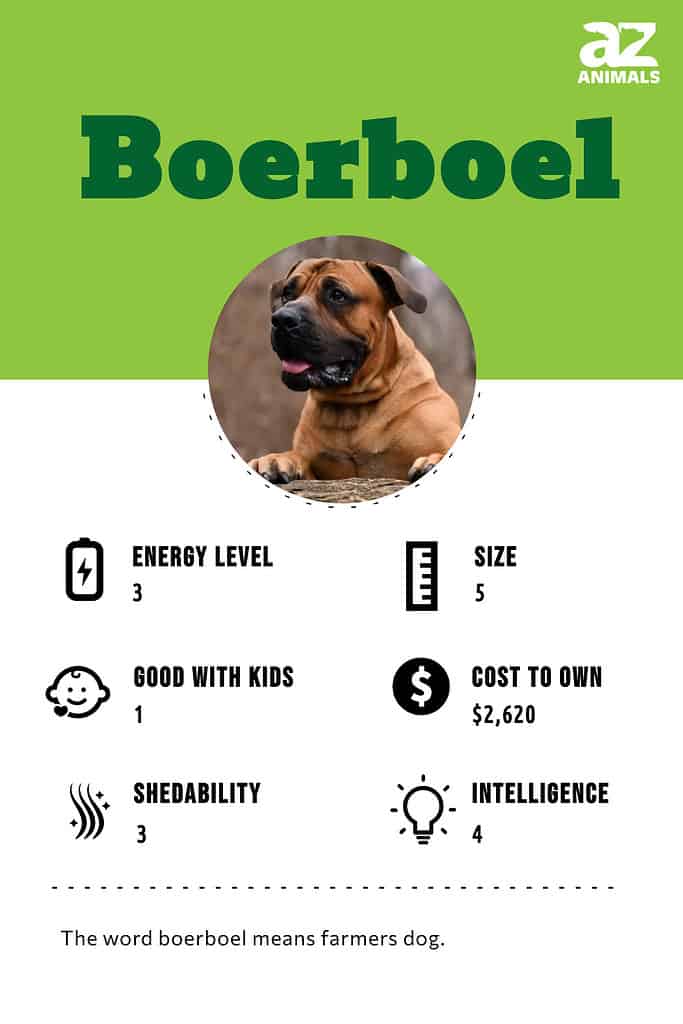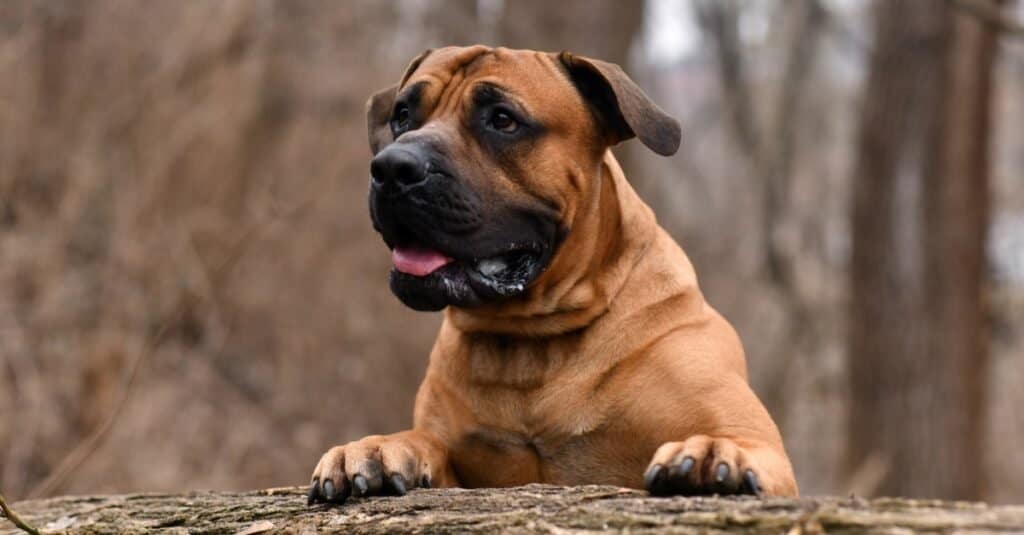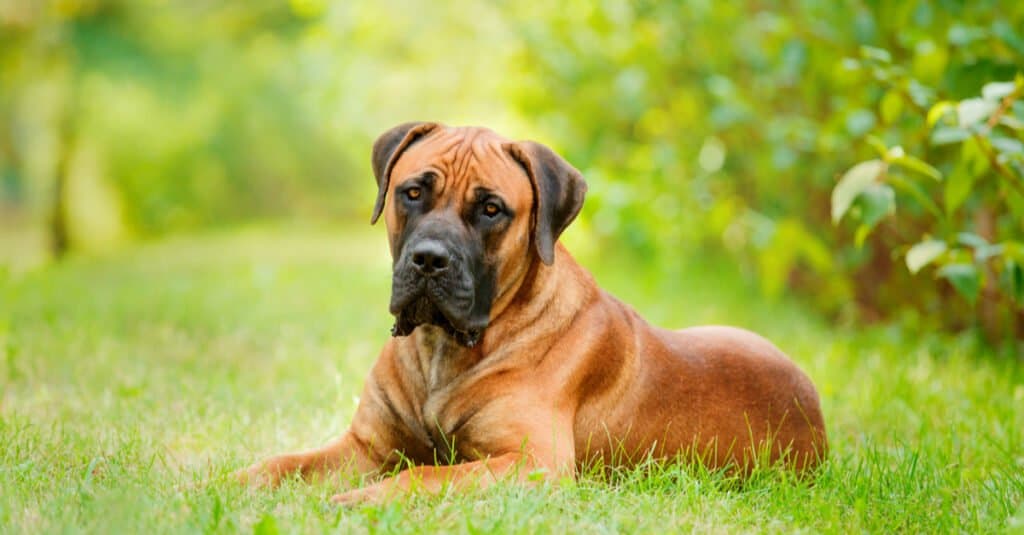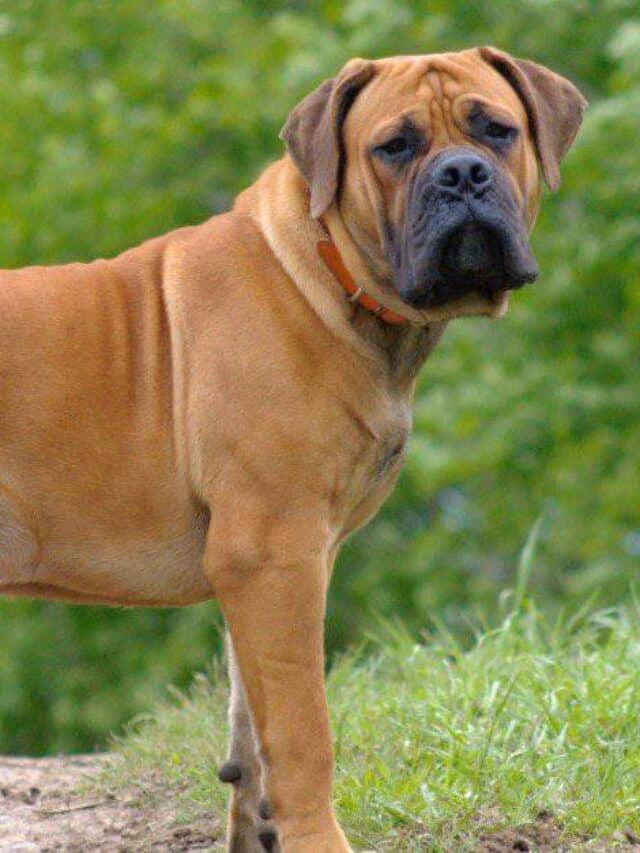Boerboel
Canis lupus
Advertisement
Boerboel Scientific Classification
- Kingdom
- Animalia
- Phylum
- Chordata
- Class
- Mammalia
- Order
- Carnivora
- Family
- Canidae
- Genus
- Canis
- Scientific Name
- Canis lupus
Read our Complete Guide to Classification of Animals.
Boerboel Conservation Status
Boerboel Facts
- Diet
- Omnivore
Boerboel Physical Characteristics
Boerboel as a Pet:
- General Health
- Energy Level
- Shedability
- Trainability
- Intelligence
- Tendency to Chew
- Size
- Family and kid friendliness
- Yappiness / Barking
- Low
- Separation Anxiety
- Low
- Preferred Temperature
- Warm climate
- Exercise Needs
- Moderate
- Friendly With Other Dogs
- Moderate
- Pure bred cost to own
- $2620
- Dog group
- Working
- Male weight
- 150-200 lbs
- Female weight
- 110-180 lbs
View all of the Boerboel images!
Dutch farmers in South Africa first bred the Boerboel in the 17th century from a nameless ancestor similar to a Mastiff. Dutch South African farmers, called Boers, produced this dog with indigenous African wild dogs to create what we know today as the Boerboel. It’s suspected that Rhodesian Ridgebacks also had a hand in creating the breed.
Farmers needed tough dogs who could work in hot climates and stand up to predators such as big cats, baboons, and hyenas. Boerboels are famously loyal and protective, and later, when diamond mining became more prominent in South Africa, miners used them to protect their territory.
These large, confident dogs are well-muscled and exceedingly obedient, making them perfect as working guard dogs or loveable family pets.
The name Boerboel derives from the Afrikaans word “boer” which means farmer, and “boel” which is a shortened version of “boelhond,” or bulldog.

History and Origins

With a history dating back to the earliest European settlements in South Africa, Boerboels are thought to have been bred as hunters as well as protectors, keeping remote outposts safe from lions and other big game.
©Natalia Fesiun/Shutterstock.com
The Boerboel breed has a fascinating history that is rooted in South Africa’s colonial past. The settlers who moved to the area in the mid-1600s were primarily from Holland, Germany, and France, and they brought with them large guard dogs to protect their land from wild animals. These early dogs included bull and mastiff types, which were crossbred over time to create what we now know as the Boer Dog.
With further refinement of this breed, the Boerboel emerged as a distinct type of dog that was specifically bred for life on a farm. In fact, it earned its name “farmer’s dog” because it was such an important part of daily life for these settlers. While other breeds may have been more suited for hunting or guarding livestock, the Boerboel excelled at both tasks.
One thing that sets this breed apart is its agility and strength when facing off against dangerous wildlife like lions and baboons. Despite being fierce defenders of their territory, however, they are not snarly brutes constantly seeking out fights. Rather than relying solely on brute force to protect those they love, Boerboels are also sensitive enough to discern friends from foes and take cues from those around them.
Another remarkable aspect of this breed is its versatility. While strong enough to compete in weight-pulling competitions alongside larger breeds like Mastiffs or Rottweilers, they are gentle enough to work as therapy animals for children or elderly people with disabilities.
The Best Dog Food For Boerboel

The Boerbel breed is a good dog for owners who like large breeds.
©Marina Plevako/Shutterstock.com
The Boerboel is a massive, muscly dog whose weight can clock between 150-200 pounds. As a giant breed, these dogs require special nutrition with plenty of protein, omega fats, and many calories to keep them happy and healthy.
Boerboel puppies benefit significantly from giant breed puppy dog kibble or formula containing optimal calcium and minerals levels to facilitate healthy bone growth. A food brand with lots of meat as the primary ingredient should provide them with plenty of protein to help them grow. For growing Boerboel pups, we at A-Z-Animals recommend American Journey Large Breed Puppy.
Once your Boerboel hits one year old, it’s time to switch to adult food. High-quality kibble with plenty of nutrients is essential for health. Protein is the main focus of these large dogs’ diets to fuel muscle mass and keep them energized. Omega fats are another crucial part of this breed’s diet, so kibbles with fish oils are also beneficial. One brand we recommend here is Blue Buffalo’s Wilderness Rocky Mountain Red Meat recipe for large breeds; it’s sure to sate the picky Boerboel’s stomach and meet his nutritional needs.
Unfortunately, Boerboels are prone to weight gain and can put on a few unhealthy pounds if his diet isn’t kept in check. Keep an eye out for extra treats and snacks, and opt for a diet-friendly kibble to help monitor weight.
3 pros and cons of owning a Boerboel
| Pros! | Cons! |
| Great with family and kids Calm and intelligent, these dogs are patient with young kids and very loving and loyal to their families. | Need a LOT of food 200 lbs of all-muscle means you’ll be spending a lot of money on Boerboel’s dietary needs. |
| Perfect guard dog Boerboels are born and bred watchdogs and will be perfect for keeping you safe. | Can develop health issues if not well-bred Big dogs are somewhat more likely to develop health issues if not purchased from a reputable breeder. |
| Easy to train These dogs are very clever, able to learn all kinds of tricks and participate in sports. | Not good with other dogs Usually, Boerboels prefer to be an only dog and are wary of stranger animals. |
Size and Weight

Boerboels weigh between 110-200 pounds.
©Natalia Fesiun/Shutterstock.com
The Boerboel female’s average high ranges from 22-25 inches tall, and males are capable of reaching about two inches taller. On average, males can weigh up to 200 pounds when fully grown, with females weighing about 180 pounds at most.
| Height (Male) | 24-27” Tall |
| Height (Female) | 22-25” Tall |
| Weight (male) | Up to 200lbs, fully grown |
| Weight (female) | Up to 180lbs, fully grown |
Common Health Issues

Boerboels are prone to hip and elbow dysplasia.
©iStock.com/AlexanderKondakov
While the Boerboel is typically a healthy dog breed, it’s important to source your pup from a responsible breeder who will scan for typical stock health conditions. These dogs are known to develop elbow and hip dysplasia, eyelid disorders such as ectropion and entropion, and heart disease. It’s advisable to look into the medical histories of your pup’s parents and to consider whether a potential health concern will fit into your lifestyle.
In short, Boerboel’s can develop issues with:
- Hip or elbow dysplasia
- Heart disease.
- Ectropion (eyelids sag outward) or entropion (eyelids roll inward)
Temperament

Boerboel dogs are affectionate and calm.
©Natalia Fesiun/Shutterstock.com
Boerboel dogs feature a lovely temperament and are affectionate with families and especially young kids. These dogs are calm, brilliant, and incredibly loyal and must be an integral part of their family to be at their happiest. Their natural guarding instinct makes socialization a necessity early on in their lives, and structured obedience training should start at puppyhood and continue into adulthood.
How To Take Care of Boerboel

Start training your Boerboel early in life for the best results.
©Jaromir Chalabala/Shutterstock.com
New pet owners seeking guidance on taking care of Boerboels at any stage in their lives must consider a range of unique factors. Maintenance, regular exercise, and training all play a role in determining whether this breed fits into your lifestyle and family.
Maintenance And Grooming
These dogs are relatively low maintenance when it comes to their coats. A simple, subtle brushing will keep it glossy, and these dogs keep themselves regularly clean. Owners should take care to trim nails and clean ears periodically, and – as always – daily teeth brushing is a must.
Training
Unsurprisingly, the Boerboel has a protective and territorial disposition and is usually wary of strangers or newcomers to the house.
Socialization early on in their lives can help reduce shyness or potential aggression. Boerboels may benefit from living with an experienced dog owner and trainer who will spend time playing, training, and exercising. Obedience training from an early stage will establish the owner as the pack’s Alpha and prevent a Boerboel puppy from thinking he owns the place.
Exercise
Boerboels are surprisingly agile for their size and muscle mass. Pups can also be energetic and benefit from regular exercise, preferably in a securely fenced front or backyard. This breed loves competition and can participate in agility, protection sports, obedience competitions, and working on farms.
Puppies
Mothers can produce anywhere between 7 to 10 pups in their litters. The babies arrive pretty large, particularly compared to other newborn dogs, but they still require attentive care. Avoid large groups or grabbing hands in the early days, as puppies can easily be frightened or traumatized.
Puppies need socialization early on to prevent any potential development of aggression. Regular visits with new people, new situations, and new dogs will prevent anxiety and keep away other negative traits such as shyness or over-protectiveness.
Boerboel And Children

Boerboel dogs make great family pets.
©Asonia/Shutterstock.com
While the breed makes fantastic family pets and is exceedingly affectionate, they can be very protective of children from the same household. They may not show the same friendliness to child strangers and should be properly introduced to any newcomers.
Similar Dogs
The Boerboel is closely related to several watchdog breeds, including the Bullmastiff, the Cane Corso, and Rottweilers.
- Bullmastiff: Like the Boerboel, Bullmastiffs were bred to protect estates and property, though this breed originated in England.
- Cane Corso: Cane Corsos are more athletic than other Mastiff types, similar to the Boerboel, and easily take to training.
- Rottweiler: The Rottweiler has a similar protective roll to the Boerboel but is on the smaller side comparatively, weighing 110–132 lbs.
Popular Names
- Brutus
- Buddy
- Toby
- Sophie
- Daisy
- Lady
Boerboel FAQs (Frequently Asked Questions)
How long does Boerboel live?
The average Boerboel lifespan is 9-11 years, similar in length to other massive dogs. They’re generally healthy, but they can suffer from size-related issues such as hip or elbow dysplasia.
Why do they cut Boerboels’ tails?
Historically speaking, breeders cut Boerboel tails to strengthen their back muscles, increase overall speed, prevent rabies, and prevent injuries when fighting or otherwise guarding their territory. Docking in modern times is done for therapeutic or cosmetic purposes usually, but many breeders keep docking as a part of Boerboels’ standard appearance.
Are Boerboels aggressive?
Boerboels can become aggressive if they’re not socialized and trained from an early age to become familiar with other dogs and people. Most will do well with other animals that reside in the same house, but they can be standoffish with stranger dogs. Boerboels can also become aggressive with others of their breed of the same sex.
Are Boerboels good family pets?
Boerboels are loving members of the family and often playful and gentle with children. As guard dogs with a tendency towards watchfulness, these pups can be fiercely protective if they perceive a threat to their home. Consistent training, socialization, and a clear Alpha-owner structure will help keep their demeanor manageable and well-behaved.
Thank you for reading! Have some feedback for us? Contact the AZ Animals editorial team.
Sources
- Desmond Morris, Available here: https://archive.org/details/isbn_9781570762192/page/618/mode/1up
- American Kennel Club, Available here: https://www.akc.org/dog-breeds/boerboel/
- Chewy, Available here: https://be.chewy.com/dog-breed/boerboel/
- Rover, Available here: https://www.rover.com/blog/best-african-dog-breeds/

















